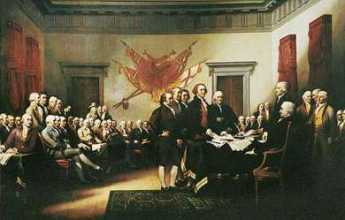Related Topics
City of Rivers and Rivulets
Philadelphia has always been defined by the waters that surround it.
Historical Motor Excursion North of Philadelphia
The narrow waist of New Jersey was the upper border of William Penn's vast land holdings, and the outer edge of Quaker influence. In 1776-77, Lord Howe made this strip the main highway of his attempt to subjugate the Colonies.
Revolution in New Jersey
Early, brief but significant.
Perth Amboy to Trenton (2)

|
| Declaration of Independence |
The Revolutionary War had been raging for a year in New England before the Declaration of Independence, a point that never ceased to bother John Adams whenever Thomas Jefferson or his devotees took credit for "starting" the Revolution -- a year after the Battle of Lexington and Concord -- with a piece of paper nailed to a lamp post. To be fair, this interval of a year allowed for the organization of the Continental Army, and Washington's growing military maturity by the summer of '76. But it also explains the landing of Sir William Howe's army on Staten Island at the end of June 1776. A month or so later, his brother Admiral Howe landed some more troops. By September 1776, not all of the signers had yet put their names to the Declaration of Independence, but there were about 40,000 British troops parading around the essentially uninhabited Staten Island in New York harbor, in plain sight of the inhabitants of New Jersey's capital in Perth Amboy, scarcely a mile away.
The British were quite shrewd in selecting New York harbor as the center of their operation, since their Navy was able to move quickly from New Jersey to Rhode Island, up and down the Hudson as far as Albany, and around the considerable expanse of Long Island, not to mention Manhattan. Meanwhile, Washington was faced with crossing numerous rivers to defend hundreds of miles of shoreline, and moving foot soldiers to the necessary position. He tried to defend New York, it is true, but the battles on Brooklyn Heights, Harlem, Fort Washington, and Fort Lee were essentially unwinnable, and the best he could do with the situation was escape with an undestroyed army.
By the fall of 1776 Howe had consolidated his hold on New York, and Washington was reduced to scattering clusters of troops around the places Howe might next choose to invade at any time. In early December, he started landing in New Jersey and marched toward New Brunswick. Washington thought that meant he was going to head for Trenton, and then down Delaware to Philadelphia. There was not much to stop him except skirmishers and Minute Men, but it was not safe for Washington to move his troops from the New York region until the intentions of the British were really clear, by which time it would probably be too late to stop the advance.
Since the Raritan Strip along which Howe and Cornwallis were advancing, was prosperous and Tory, things went pretty well for the British. After two weeks march, they finally arrived in Trenton around December 20. In this triumph, they failed to appreciate the significance of several things, however. Washington was hurriedly summoning about six little colonial armies of five hundred to a thousand men each, to join him now that the intentions of the enemy were clear. Furthermore, the Whigs or rebels of New Jersey were aroused in the Pine Barrens of the South and the hills of the North; New Jersey was not as Tory as it seemed during the initial march down along the Raritan. And, finally, the British and Hessian mercenary soldiers had ravaged the countryside almost as much as the spinmeisters of the Whig patriot cause shouted out they had. The Quaker farmers were particularly upset by the activities of the camp followers, who pillaged curtains and other things not normally attractive to marauding soldiers. And the sharpshooters, loyalist, and rebel were close enough to their own homes to dispose of another booty. It was a cakewalk from New Brunswick down to Trenton, but it was not going to be the same coming back.
Washington got ready to defend the Capitol in Philadelphia, and the wide Delaware river was the best place to do it. When Howe and Cornwallis reached Trenton, they found no boats available for miles up and down the New Jersey side of the river, artillery was planted in strategic places on the Pennsylvania side, ice was beginning to form on the river, it was cold and the December days were short. To the British commanders, Washington posed no particular military problem with his naked ragamuffins. Howe had some lady friends in New York, while Cornwallis was planning to spend a month in London before the spring military season. So the British generals made an overconfident miscalculation, and posted their troops in winter quarters, strung out in outposts from Perth Amboy to Trenton and down to Bordentown. A thousand Hessians were quartered in Trenton. By December 20th, it looked like a peaceful but boring Winter.
REFERENCES
| The Pine Barrens: John McPhee: ISBN-13: 978-0374514426 | Amazon |
Originally published: Friday, June 23, 2006; most-recently modified: Friday, May 31, 2019